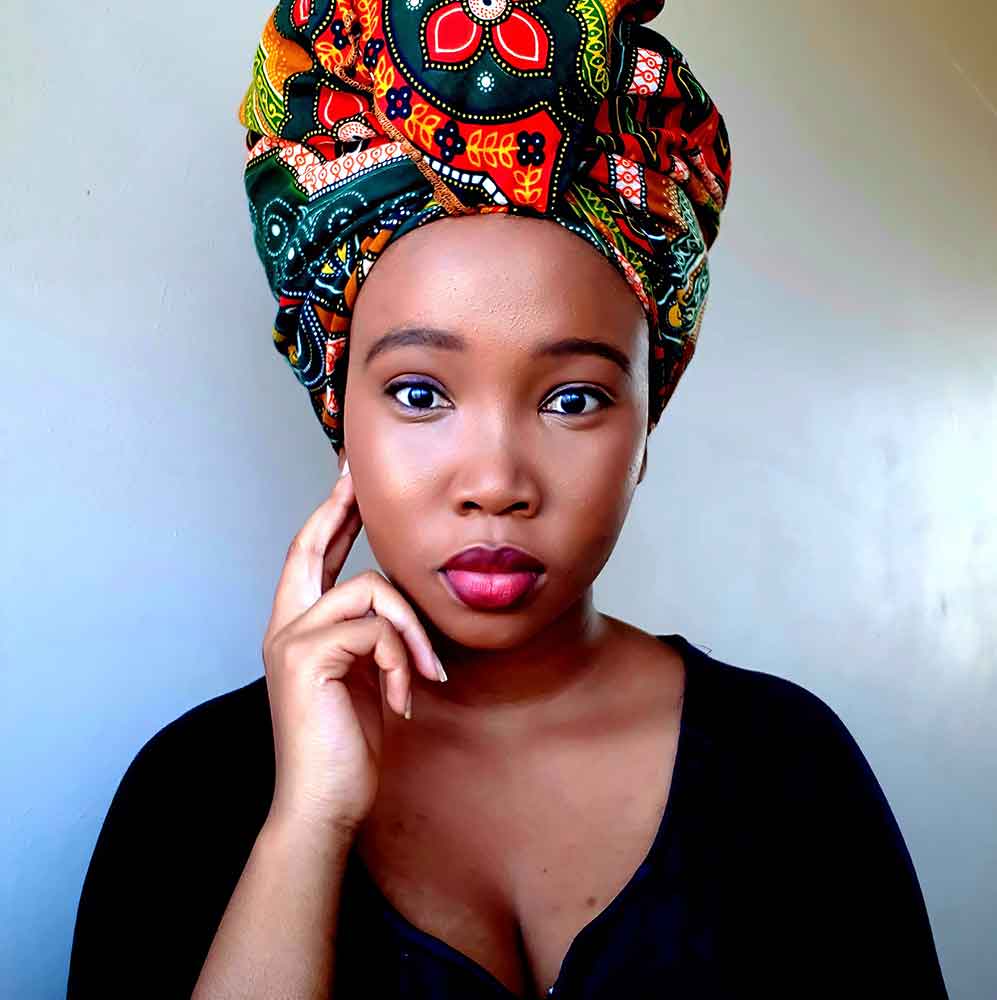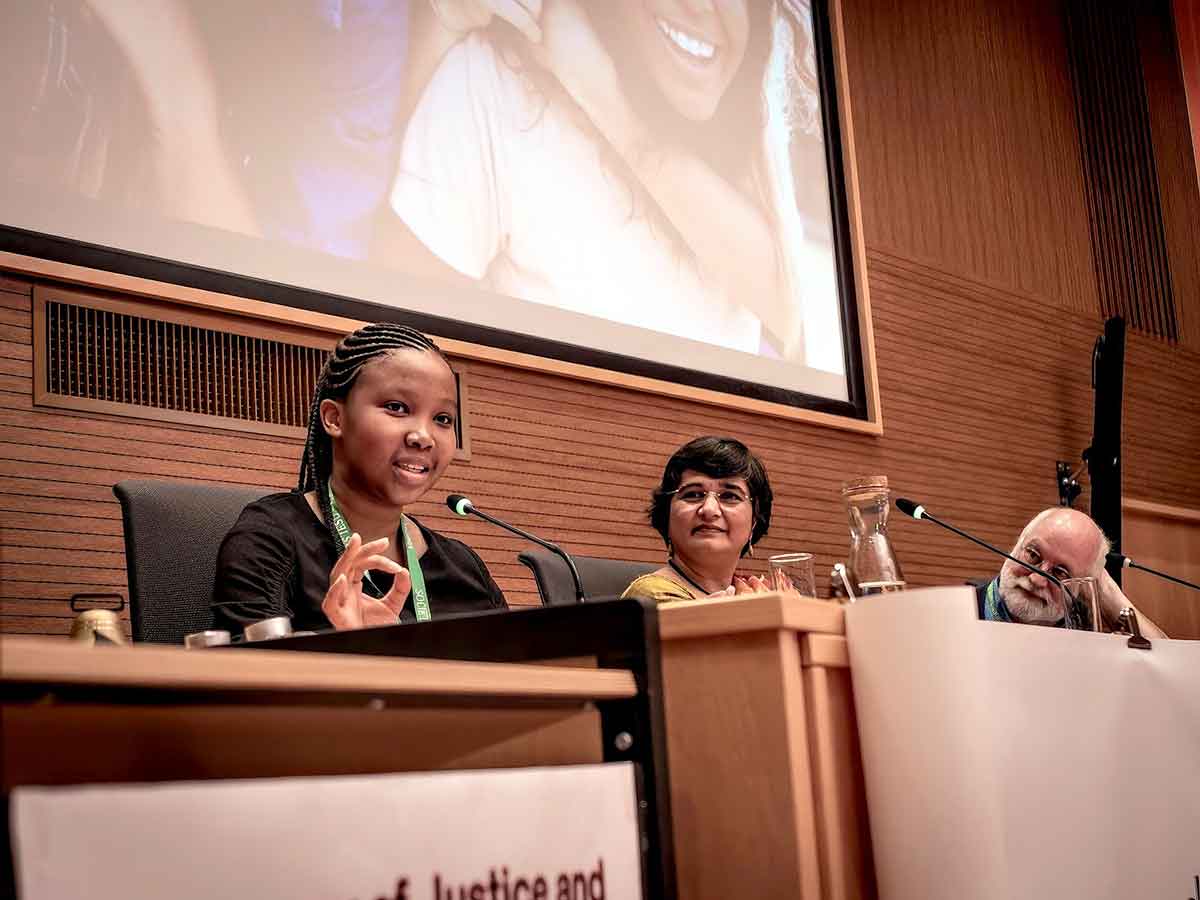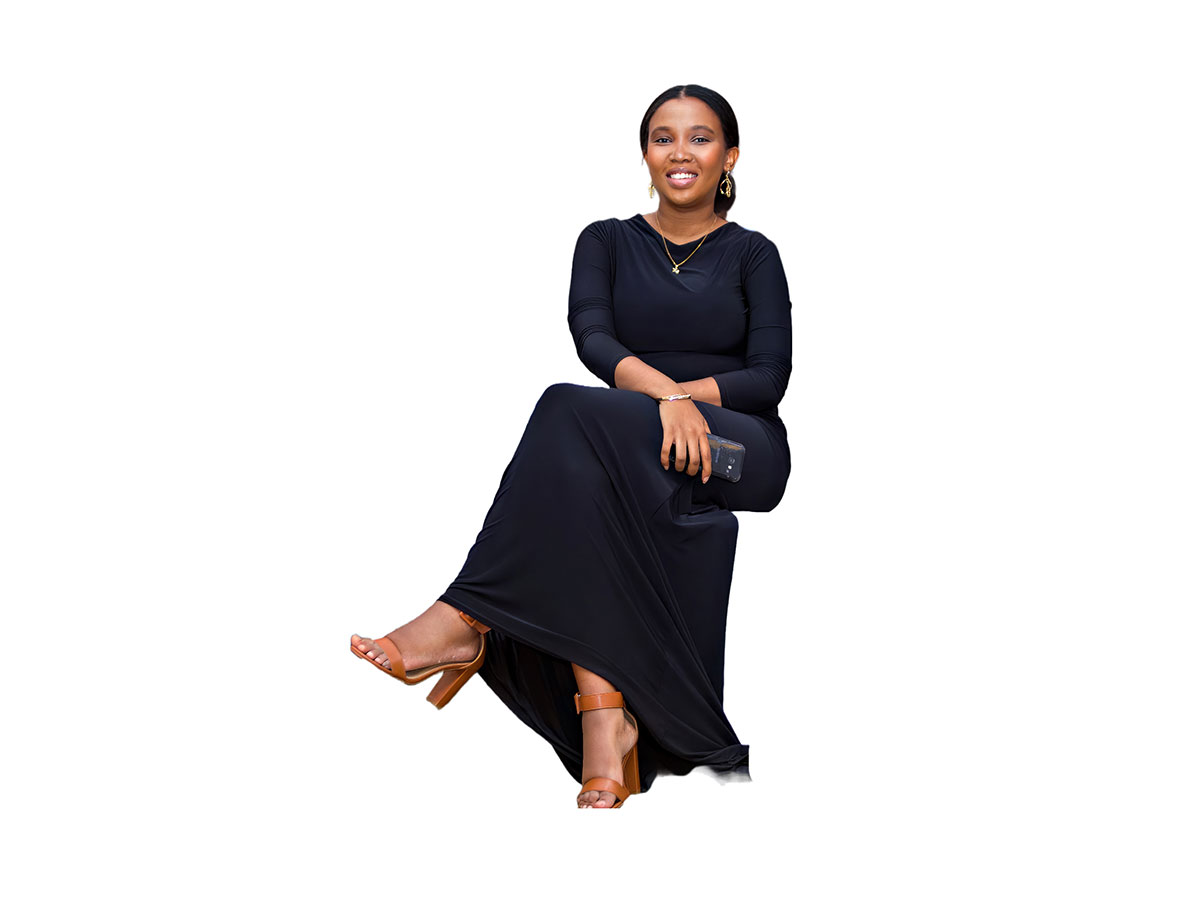Noluthando Honono: All Up for Debate

Noluthando Honono is one of South Africa’s leading debaters. She tells Daluxolo Molantoa about her debating life and Catholic activism.
Saint Paul asked the Corinthians: “Where is the one who is wise? Where is the scribe? Where is the debater of this age?” (I Cor 1:20). In the context of the Church in South Africa, an answer to this question can be given in the form of a young Catholic woman who is charting a new path in the South African debating scene.
Twenty-seven-year-old Noluthando Honono has achieved international honours not only as a debater but also as an adjudicator. And when she is not debating, she is engaged in Catholic projects.
The oldest of four children, Noluthando was born to a Sotho father and a Xhosa mother. She spent the early years of her life in Nyanga East, and moved to Blue Downs on the Cape Flats to live with her grandmother when she was six years old. “One of my fondest memories of identifying as a Catholic is my grandmother’s Sacred Heart Sodality uniform. We lived in Blue Downs but went to St Mary’s church in Nyanga East,” she recalled.
Her grandmother is the person Noluthando looks up to the most. “She is the model of an honest and tough but loving human being. My upbringing, my value system, and everything I have achieved is as a result of my grandmother’s resilience and her willingness to help me to be the best person I can be. She has done that for all my cousins and she is doing it for my siblings, now that my parents have passed,” she told The Southern Cross
At an early age, Noluthando had already memorised certain parts of the Holy Mass, and she would recite these in tandem with the parish priest, Fr Gerard Lorriman SJ. Popularly known as Fr Jerry, the English-born Jesuit priest served at St Mary’s church for over two decades, and also as Catholic chaplain to political prisoners on Robben Island during the apartheid years.

In 2019, Noluthando Honono was the youngest delegate at a global Jesuit congress for Social Justice and Ecology, held in Rome. She regards the Jesuits as her mentors.
“Fr Jerry learned the isiXhosa language so that he could celebrate Holy Mass in it. As a child, I found this old white man praying with me in my own language very fascinating because the white people I knew spoke only English or Afrikaans,” Noluthando recalled.
Being a shy child, Noluthando kept to herself and didn’t get involved in the parish’s life. This changed when she was 12 years old. “Like other children, during Mass I’d sit in the children’s section. This is where I started getting to know and befriended a group of girls who were liturgical dancers, and were in preparation to become altar servers. I joined them to also become a liturgical dancer and an altar server. This was the beginning of what would become my many years of service at St Mary’s,” she recalled. She later became a facilitator for Education for Life, and served on the executive committee of the youth group.
Noluthando attended the Redemptorist-run St Mary’s Primary School in Retreat, Observatory Junior School, and high school at Sans Souci Girls’ School in Newlands and the Cape Academy of Mathematics, Science and Technology. Her aspiration was to become a medical doctor. “However, finances meant that I had to make compromises. This is how I ended up studying towards a law degree at Nelson Mandela University in Gqeberha.”
Law is a field Noluthando has certain reservations about, “because of the multiple ways it may require me to compromise myself and my beliefs. However, if I had to choose a field of specialisation to practise as a lawyer, it would most certainly be family law,” she said.
Alongside advancing in the debating field, she is still pursuing her ambitions of becoming a medical doctor.
She has been admitted for studies towards a BSc degree in Biomedical Sciences through the University of South Africa (UNISA). She intends to study and save the funds for going to medical school immediately after her completion of the degree.
International debating success
Noluthando stumbled into the world of debating by accident at high school. “I was thrust into the world of debating by a teacher at Sans Souci. She felt that I had the potential to be a noteworthy debater, but my fear of public speaking was holding me back. My teacher ‘forced’ me to join the debating team at the school. Because I wasn’t a sporty person, I figured that I should keep doing it. I eventually began to enjoy it.”
Her debating prowess has won Noluthando tournaments in South Africa, including the Pretoria Parley Invitation, the Free State Open, and the Southern Africa Women’s Open, among others. She has also taken part in and even judged many international finals and out-rounds at tournaments. These include the World Universities Debating Championships (WUDC), the world’s biggest debating tournament, with teams representing universities from around the world. Last year, she took part in the WUDC in Belgrade, Serbia, where she was also appointed deputy chief-adjudicator. She has also taken part in the prestigious Doxbridge Worlds, which are debating events hosted by students and graduates from the English Universities of Durham, Oxford and Cambridge.

But Noluthando’s greatest highlight thus far has been her appointment as the chief adjudicator for the Pan-African Universities Debating Championship (PAUDC) in December in Togo. The PAUDC is the biggest universities debate championship in Africa.
Noluthando currently works as a debating coach for multiple schools in Johannesburg. “I relish the impact that the training sessions and the resultant wins have on the kids. My flagship school is St Stithian’s College. My ultimate reward is when I watch a student whom I coach and mentor go on to do really great things,” she said.
Social inequalities based on race, income and status are a prevalent feature of South African society. The debate scene is no different, Noluthando noted. “The development of debating in South Africa needs the involvement of more stakeholders, so that we are able to reach the more remote areas of the country as well as schools that don’t have the ability to fairly compensate a coach. I believe that debating should form part of the curriculum in a more meaningful way because all of the skillsets taught by debating are integral to success in education,” she said.
The Jesuit connection
Being a person who attended church at a Jesuit-run parish for most of her life, it was only natural that Noluthando would collaborate with the Society of Jesus on various projects. Her first project with the Jesuit Fathers was in 2017, when Fr Rampe Hlobo SJ organised a trip for her to Kenya for a training-of-trainers course, with a focus on Catholic Social Teachings. This led her to further engagements with Jesuit projects, such as the Kenya-based Jesuit Justice & Ecology Network Africa.
Noluthando’s involvement with the network is on-going. She has contributed to the post-pandemic “Bring the Girl Child to School” campaign, the youth development project “Lead+Magis Africa”, and the “Economy of Francesco”, a Pope Francis-inspired international movement of young Catholic economists, entrepreneurs and changemakers engaged in a process of inclusive dialogue for global change and moving towards a new economy.
She has also been engaged in the Africa Synodal Initiative, and contributed to a handbook distributed at the Continental Synodal Assembly in Addis Ababa, Ethiopia, in March.
The Capetonian now lives in Johannesburg, where she has not been able to settle at one parish. “At the moment, I am floating to find a new home,” Noluthando said. Her spiritual regimen includes doing an examen (a daily Jesuit devotional conscience exercise) at the end of the day, and the rosary once a week. She finds the Living Faith Daily Catholic Devotions website helpful for readings and daily prayers.
A need for discussion in the Church
The keen debater feels strongly about open discussion within the Church. “As in the broader society, there are so many things we need to address as the Catholic Church. Many of them require starting at a grassroots level by ensuring that priests are taken care of psychologically. Catholic priests take in a lot when hearing confessions and while doing their work in parishes or as missionaries. Secondly,
I believe that we need to ensure that we allow ourselves to engage with what may be more uncomfortable conversations, such as the changing structure of the family, the LGBTQIA+ community, the rights of women and the masculine nature of the Church, the stance on contraception, the youth, and our need to receive clear answers on these questions.” That includes difficult topics: “I am very interested in what the conversation on female priests will yield,” she said.
Noluthando believes that it is up to young women to realise their God-given talents and, most importantly, to make the first move in pursuing them. “Young women have the ability to be who they envision themselves to be.”
She advises young women: “Use the resources available to you to grow and develop. Use the Internet as a tool to seek out opportunities in whatever field you are passionate about. Start your content creation, write your book, study towards that degree, apply for that scholarship — do it all. Take care of yourself, seek therapy, and be kind to yourself.”
Published in The Southern Cross August 2023 issue
- Cameron Upchurch: Making Music fit for God - February 27, 2026
- Sr Majella Quinn’s Life of Service - February 9, 2026
- Moloantoa and Seleke Present Inspiring Catholic Memoirs to First Lady Dr Tshepo Motsepe-Ramaphosa - February 4, 2026





